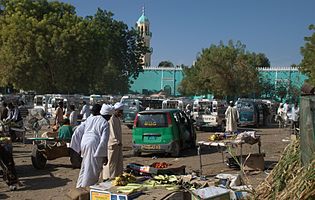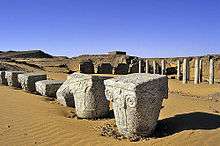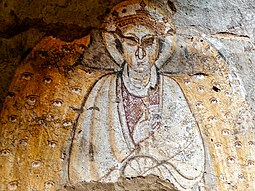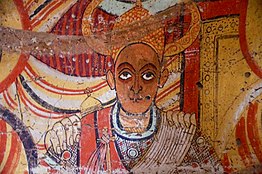Dongola
Dongola (Arabic: دنقلا Dunqulā), also spelled Dunqulah, is the capital of the state of Northern Sudan, on the banks of the Nile, and a former Latin Catholic bishopric (14th century). It should not be confused with Old Dongola, an ancient city located 80 km upstream on the opposite bank[1].
Dongola | |
|---|---|
 Dongola Location in Sudan | |
| Coordinates: 19°10′11.37″N 30°28′29.62″E | |
| Country | |
| State | Northern |
| Population (2010) | |
| • Total | 13,473 |
Etymology
The word Dongola comes from the Nubian word "Doñqal" which means red brick[2], as most buildings were made of bricks, thus provoking one of ancient Nubia's biggest industries. A more modern use of the word is to describe a strong and hard bulwark, that being so Dongola is often called "the Resident of a large Nile castle".
When Khedive Ismail Pasha made it the center of his army during the invasion of Sudan in 1821[3], Dongola was a “shouña”, meaning a center in which taxes and tithe money represented in the crops, grains, and beasts were collected before being sent to the Sultan of Funj in Sennar[4] who ruled the region. He called it "Aorita", which is a Turkish-Egyptian military term that means the military division or the headquarters of the military division, and the people misrepresented the word to "Al-Urdy" and then finally to "Al-Ardi", which became a title for Dongola.
History
Dongola was a province of Upper Nubia on both sides of the Nile[5], and the city was a centre for Nubian civilization, as manifested by its many archaeological remains from the Makurian and Islamic periods. Dongolawis originate from early indigenous Nubian Sub Saharan African inhabitants[6] with many taking pride in their mostly non mixed ancestry; although always faced with criticism this helped preserve the Nilo Saharan Dongolawi Nubian language (known as Rutana ), however, cultural preferences are slowly changing. The remains of the revered Baqt Treaty are to be found in Dongola. The province of Dongola was part of the Makuria kingdom, which later became part of Egypt after Muhammad Ali Pasha ordered the invasion and occupation of Sudan in 1820; after which it was designated as a seat of a pasha. Its first governor was Abidin Bey.
Modern Dongola was established in early 1812 after Nubian Mamluks escaped massacres envisioned Muhammed Ali Pasha. In 1821 however, Muhammad Ali's forces, lead by his son Ismail Pasha, successfully conquered Dongola [7]where he set up an army base named Al-A'oritah , thus forcing Mamluks and the indigenous to move to Shendi[8]

Dongola was the scene of a victory by General Herbert Kitchener over the indigenous Mahdist Muslim tribes in 1899 who later turned it into a british-egyptian army base with the objective of collecting and storing weapons, gear and resources. Dongola was a considered an all time base for sending campaign reports to Britain, and the first English press release was issued in the name of Dongola Star, with news of the British-Egyptian army in Sudan. [9] Kitcheners forces have been known for extreme brutality, killing over 15,000 in the Battle of Omdurman before conquering Dongola, and later on proceeded killing the wounded, raising the overall death toll to over 50,000. [10]
Dongola Road and Dongola Avenue in the Bishopston area of Bristol were named after this event; as was Dongola Road in Tottenham, North London which runs next to Kitchener Road. There is also a Dongola Road in Jersey (Channel Islands). Dongola, Illinois, in the United States, was established in the 1850s, and named for Dongola.[11]
Ecclesiastical history

The Latin Catholic Diocese of Dongola was established in 1330 and suppressed in 1350. No incumbent is recorded.[12]
Old Dongola , an important city in medieval Nubia, and the departure point for caravans west to Darfur and Kordofan, is one of Sudans historical tourist destinations. Nubian architecture and methodologies in old Dongola are now being studied by the Polish Centre of Mediterranean Archaeology initiated by Kazimierz Michalowski

Nubian Temples and old Churches are also common tourist destinations.


Education
The town is home to the University of Dongola, a public university.[13]
Dongola racing
The Nile Expedition of 1884–1885 to relieve Gordon at Khartoum passed through the area. Regiments were challenged to race up the river by boat, and this gave rise to the English regatta competition of dongola racing.
Climate
Dongola has a hot desert climate (Köppen climate classification BWh). Dongola is located in one of the hottest, sunniest and driest regions in the world.
| Climate data for Dongola (1961–1990) | |||||||||||||
|---|---|---|---|---|---|---|---|---|---|---|---|---|---|
| Month | Jan | Feb | Mar | Apr | May | Jun | Jul | Aug | Sep | Oct | Nov | Dec | Year |
| Record high °C (°F) | 36.6 (97.9) |
42.2 (108.0) |
46.0 (114.8) |
46.5 (115.7) |
48.6 (119.5) |
49.1 (120.4) |
49.0 (120.2) |
46.6 (115.9) |
46.8 (116.2) |
44.4 (111.9) |
40.1 (104.2) |
37.3 (99.1) |
49.1 (120.4) |
| Average high °C (°F) | 26.7 (80.1) |
29.4 (84.9) |
33.8 (92.8) |
38.6 (101.5) |
41.8 (107.2) |
43.4 (110.1) |
42.2 (108.0) |
41.8 (107.2) |
39.8 (103.6) |
38.4 (101.1) |
32.1 (89.8) |
28.3 (82.9) |
36.4 (97.5) |
| Daily mean °C (°F) | 17.6 (63.7) |
19.6 (67.3) |
23.9 (75.0) |
28.5 (83.3) |
32.1 (89.8) |
34.0 (93.2) |
33.6 (92.5) |
33.5 (92.3) |
32.3 (90.1) |
29.4 (84.9) |
23.5 (74.3) |
19.3 (66.7) |
27.3 (81.1) |
| Average low °C (°F) | 8.5 (47.3) |
9.8 (49.6) |
13.9 (57.0) |
18.5 (65.3) |
22.3 (72.1) |
24.7 (76.5) |
25.0 (77.0) |
25.2 (77.4) |
24.7 (76.5) |
20.4 (68.7) |
14.8 (58.6) |
10.2 (50.4) |
18.2 (64.8) |
| Record low °C (°F) | −2.7 (27.1) |
1.0 (33.8) |
4.3 (39.7) |
8.4 (47.1) |
12.6 (54.7) |
17.3 (63.1) |
19.3 (66.7) |
18.0 (64.4) |
16.6 (61.9) |
11.4 (52.5) |
6.0 (42.8) |
2.1 (35.8) |
−2.7 (27.1) |
| Average precipitation mm (inches) | 0.3 (0.01) |
0.0 (0.0) |
0.0 (0.0) |
0.0 (0.0) |
0.0 (0.0) |
0.5 (0.02) |
0.0 (0.0) |
3.2 (0.13) |
7.7 (0.30) |
0.1 (0.00) |
0.5 (0.02) |
0.0 (0.0) |
12.3 (0.48) |
| Average precipitation days (≥ 0.1 mm) | 0.1 | 0.0 | 0.1 | 0.0 | 0.1 | 0.0 | 0.5 | 0.9 | 0.1 | 0.2 | 0.0 | 0.0 | 2.0 |
| Average relative humidity (%) | 35 | 30 | 23 | 21 | 18 | 17 | 21 | 22 | 21 | 25 | 32 | 36 | 25 |
| Mean monthly sunshine hours | 306.9 | 294.0 | 319.3 | 321.0 | 325.5 | 339.0 | 334.8 | 337.9 | 288.0 | 319.3 | 315.0 | 313.1 | 3,813.8 |
| Percent possible sunshine | 91 | 91 | 85 | 85 | 84 | 89 | 81 | 83 | 78 | 88 | 93 | 91 | 87 |
| Source: NOAA[14] | |||||||||||||
References
- "Old Dongola". Ancient History Encyclopedia. Retrieved 2020-07-01.
- "معنى كلمة دنقلا". maraga.ahlamontada.com (in Arabic). Retrieved 2020-07-01.
- https://www.britannica.com/biography/Ismail-Pasha
- "سلطنة سنار", ويكيبيديا (in Arabic), 2020-06-25, retrieved 2020-07-01
- "Nubia | Definition, History, Map, & Facts". Encyclopedia Britannica. Retrieved 2020-07-01.
- "قبيلة الدناقلة". maraga.ahlamontada.com (in Arabic). Retrieved 2020-07-01.
- "Ismāʿīl Pasha | Ottoman viceroy of Egypt". Encyclopedia Britannica. Retrieved 2020-07-21.
- Surri, Mohammad (2019-06-26). "محلية دنقلا في السودان". اقرأ - السوق المفتوح (in Arabic). Retrieved 2020-07-21.
- Surri, Mohammad (2019-06-26). "محلية دنقلا في السودان". اقرأ - السوق المفتوح (in Arabic). Retrieved 2020-07-21.
- "Sudanese honour warriors who fell fighting British - Sudan Tribune: Plural news and views on Sudan". www.sudantribune.com. Retrieved 2020-07-21.
- "Dongola, IL - Dongola, Illinois Map & Directions - MapQuest". www.mapquest.com. Retrieved 2020-07-01.
- http://www.gcatholic.org/dioceses/former/dong0.htm GCatholic.org
- "University of Dongala". University of Dongala. Archived from the original on 2011-12-06. Retrieved 2011-09-17.
- "Dongola Climate Normals 1961–1990". National Oceanic and Atmospheric Administration. Retrieved April 23, 2015.
Sources and external links
| Wikimedia Commons has media related to Dongola. |